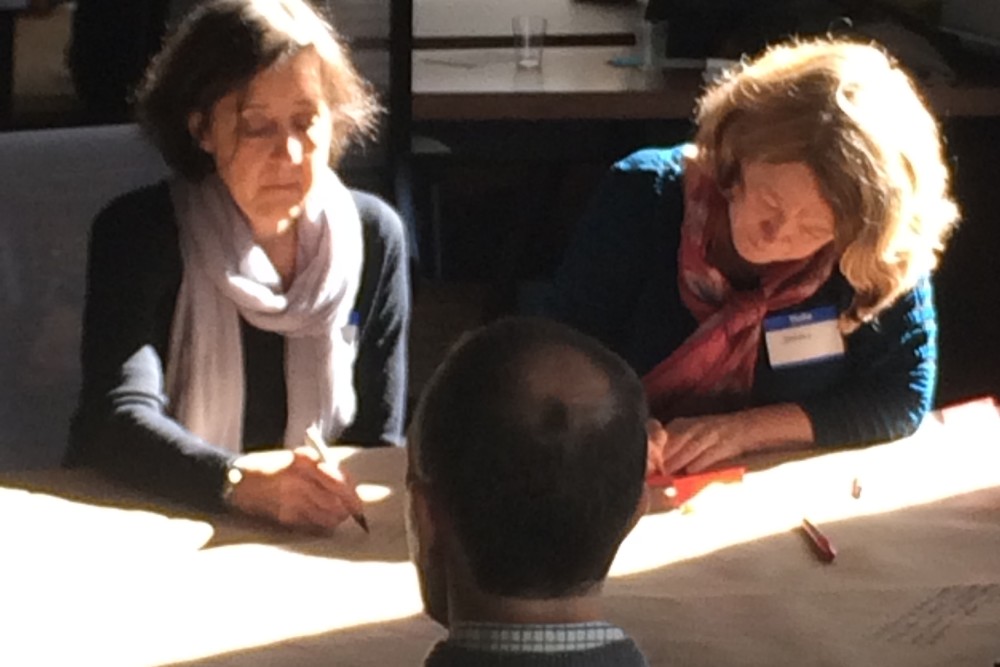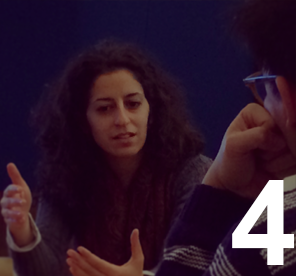Reflection
Category
lab
Date
January 31, 2014
Reflection
After the workshop was over, we received a letter from Rita Charon, MD, PhD, Professor of Clinical Medicine and Director of the Program in Narrative Medicine at the Columbia University College of Physicians and Surgeons. The following are her thoughts on the activities of the day, as addressed to Lance Weiler and the LearnDoShare team:
“Here is what I thought. The day was nothing like what I was expecting. I thought it would be a process geared toward coming up with tips on how to write about your sickness. Or I thought it would be time reserved for complaints about doctors and how to get back at them. Or I thought it would be a primer on how to find the right chat room to find people who share your disease.
It was nothing of the kind.
Instead, it was a very structured organized avenue toward opening meaningful conversation among strangers about topics that are hard to talk about, multi-pronged, bound to raise hackles or at least disagreements, and guaranteed to hit persons in their soft spots. The finger goes to the place that hurts.
You used crowd-sourcing techniques, it seemed to me, to source the crowd we were in. You made us a crowd that was readable and, hence, recognizable to ourselves. The use of the colored stickies with the + and – comments, for example, that you and Sarah arrayed on the stage for that panoramic photo was dazzling. You were able, graphically, to tell us that we converged, that we had a lot to say to one another, that the voices were heard. The behind the scenes (or during lunch) work that Sarah masterminded was simply amazing.
So over the course of a highly choreographed but apparently informal 8 hours, we progressed from being slightly edgy strangers to becoming a crowd or group or coven engaged in powerful work that could not have been done by any other assortment of people. You didn’t come up with the questions to ask us as much as you encouraged us to come up with the questions. ‘t was a matter not necessarily of airing opinions or articulating positions but rather of the gradual self-recognition of a group. We became stickies.
Now: what did this teach me about digital story-telling in health care? Not very much in the technical domain, although some people tried hard to press that point. It taught me a lot about suffering undergone by the sick and those who try to take care of them. It moved me toward individual persons (Catherine’s anorexic student, the young woman ill served by her psychiatric hospitalization). It helped me, personally, to learn that the kind of work my group does is of interest to many outside of it.
I think I learned more about your methods than about the content of the day. My jaw dropped at your, Lance’s, ease and fluidity despite the highly intentional aspect of every gesture. Not that it was practiced or stagey. Instead, you rely on these methods that you’ve developed over time that really do form a clearing where strangers can gather in some safety, where they are encouraged to risk a little and then a little more in exposing deep and high-stakes memories or beliefs. Unlike the so-called trust games of the 1970s, this is not a gimmick. It is founded on common-sense and high-theory knowledge of how people think, how they congregate, what guarantees safety, and how language can tie. I think it rests on your awareness or conviction that you, as convener, are not the thinker for the group. You are not the authority or decision-maker or even particularly interested in having others agree with you. Instead, you are the midwife for the group to birth itself.
Since the workshop, my group and I are engaged in two new projects in digital storytelling in health care. Catherine and Daniel Eison and I are meeting with the founders of the Center for Digital Health Humanities whose headquarters is in a Renaissance castle outside Rome. They want to partner with us in some way. And then Thursday, Donna Bulseco and I meet with a publisher/marketer/on-line maven who wants to bring our work in Narrative Medicine way outside its current boundaries. Both these initiatives involve members of my group who attended your workshop and advance what we discovered there in new directions. So I guess that constitutes evidence that something happened as a result of the day.”
How To
Some info on how to…
Results

